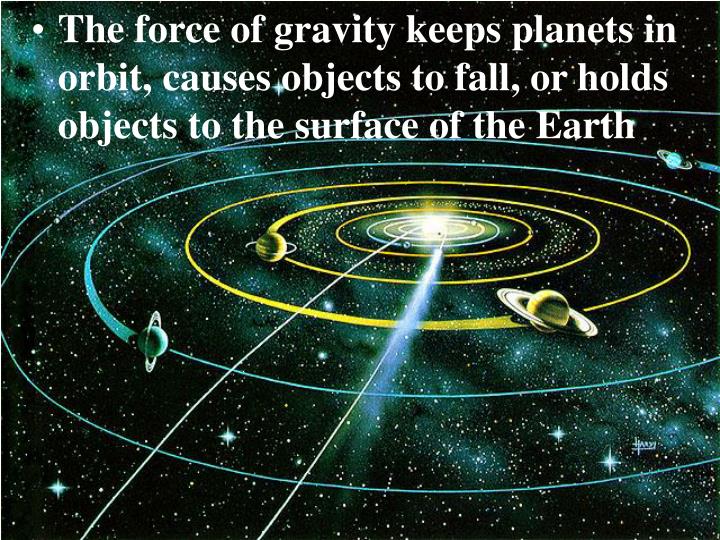Gravity keeps earth and the other planets orbiting around the sun it also holds the universe together far beyond our solar system

Gravity: The Force That Holds the Universe Together
Gravity is a fundamental force that exists throughout the universe, playing a crucial role in shaping celestial bodies and keeping them in motion. It is responsible for Earth’s orbit around the Sun and holds the entire universe together, far beyond our solar system.
Understanding Gravity:
Gravity is often associated with the phenomenon that keeps our feet planted on the ground. However, its influence extends much further. Gravity is the attractive force that exists between any two objects with mass, and it is directly proportional to their masses and inversely proportional to the distance between them. In simpler terms, the more massive an object is, the stronger its gravitational pull.
The Role of Gravity in Our Solar System:
Our solar system consists of the Sun, eight planets, numerous moons, asteroids, and comets, all held together by gravity. One of the most significant effects of gravity within our solar system is its role in maintaining the planetary orbits.
Take Earth, for example. The force of gravity exerted by the Sun keeps our planet in a consistent orbit, enabling it to revolve around the Sun in an elliptical path. Earth’s gravity also influences the other celestial bodies within its vicinity, including the Moon, which orbits around Earth due to the gravitational interaction between the two.
Gravity’s Influence Beyond Our Solar System:
While gravity plays a vital role within our solar system, its effects extend far beyond. On a larger scale, gravity is instrumental in holding galaxies together. The immense gravitational force between stars within a galaxy prevents them from drifting apart. Furthermore, gravity also governs the motion of galaxies within galaxy clusters, maintaining a delicate balance between the inward pull of gravity and the outward expansion resulting from the Big Bang.
The Power of Gravity in the Universe:
Gravity truly showcases its power when it comes to phenomena like black holes. These cosmic wonders are born from the gravitational collapse of massive stars, creating a region in space with such an intense gravitational field that nothing can escape its pull, not even light itself.
Additionally, gravity plays a crucial role in the formation of stars and planets. The gravitational collapse of a cloud of gas and dust leads to the birth of a star, with planets forming around it due to the gravitational attraction between the star and debris in its orbit.
Exploring the Mysteries of Gravity:
Comprehending gravity’s true nature and its significance in a cosmic context is an ongoing pursuit for astronomers and physicists. Countless observations, experiments, and theoretical models have contributed to our understanding of this force. NASA, in particular, has been at the forefront of studying gravity, unraveling its mysteries and expanding our knowledge of the universe.
If you’d like to delve deeper into the subject, the National Aeronautics and Space Administration (NASA) provides fascinating insights and details on gravity and its role in the universe. Visit here to explore more.
 Image Source: SlideServe
Image Source: SlideServe
In conclusion, gravity serves as the force that keeps Earth and the other planets orbiting around the Sun within our solar system. Furthermore, it plays a crucial role in holding galaxies together and shaping the universe on a grand scale. Understanding the power and influence of gravity allows us to appreciate the awe-inspiring nature of our cosmos.
 Image Source: Pinterest
Image Source: Pinterest
Related Posts
Quick Links
Legal Stuff

